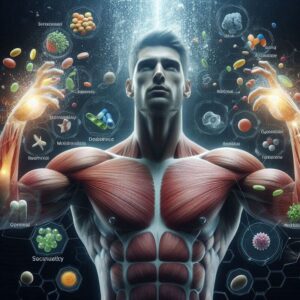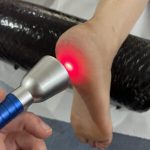Master Your Recovery: Essential Nutritional Strategies for Enhanced Muscle Repair
To attain optimal muscle recovery, prioritizing the right macronutrient ratios in your daily diet is crucial. The three essential macronutrients—protein, carbohydrates, and fats—serve not only as vital energy sources but also as fundamental building blocks that sustain your body's structure and support various physiological functions. Each macronutrient plays a distinct role in the repair and regeneration of muscle tissue. For athletes committed to maximizing their athletic performance, it's imperative to understand how these nutrients work synergistically to facilitate recovery processes effectively.
Within these macronutrients, protein is particularly significant for muscle recovery due to its composition of critical amino acids necessary for efficient muscle repair and growth. After engaging in workouts, consuming an adequate amount of protein substantially enhances muscle protein synthesis, the process by which new muscle proteins are created while simultaneously minimizing the breakdown of existing proteins. This delicate balance is essential for achieving optimal muscle recovery, allowing for quicker recuperation and adaptation to the stress of training. Furthermore, carbohydrates are crucial for replenishing glycogen stores that are depleted during strenuous exercise, thereby providing the energy required for subsequent workouts. Lastly, fats contribute to energy production and hormone regulation, both of which are vital components for effective muscle recovery.
To identify the most effective macronutrient ratio for your muscle recovery, a personalized approach is necessary, considering vital factors such as body composition, workout intensity, and individual fitness goals. A general guideline recommends consuming a balanced combination of protein and carbohydrates within 30 minutes to 2 hours post-exercise to optimize recovery. This timing is critical, as your body enters a heightened state of nutrient absorption, creating the perfect opportunity to nourish your muscles and promote recovery.

Uncover High-Quality Protein Sources to Accelerate Muscle Recovery
Understanding that protein is not merely another dietary element but a crucial factor in muscle recovery is essential for anyone engaged in physical training. This vital macronutrient supplies the amino acids necessary for both muscle repair and growth, making it imperative to incorporate protein-rich foods into your diet to optimize muscle restoration. Excellent sources of animal protein, such as eggs, dairy products, lean meats, fish, and poultry, provide complete amino acid profiles that are especially beneficial for muscle regeneration and recovery.
For those who prefer plant-based alternatives or wish to diversify their protein sources, numerous exceptional options are available. Foods like lentils, chickpeas, and black beans are not only nutrient-dense but also rich in protein, contributing significantly to muscle recovery. Additionally, versatile options such as tofu, tempeh, edamame, and other soy-based products present fantastic complete protein sources that can be easily incorporated into a balanced diet to support muscle healing.
Moreover, protein supplements like whey, casein, or plant-based powders can be remarkably effective in enhancing your protein intake specifically for muscle recovery. These supplements provide a convenient method to ensure you meet your post-workout protein needs, allowing for seamless incorporation into your favorite smoothies, shakes, or meals, thus maximizing your recovery potential and supporting your overall fitness journey.
Restore Glycogen Levels with Carbohydrates for Enhanced Muscle Recovery
Carbohydrates are crucial in muscle recovery, chiefly by replenishing glycogen stores that become depleted during vigorous physical exertion. Consuming carbohydrates within the first 30 to 60 minutes following exercise can significantly support energy restoration and accelerate muscle recovery. During intense workouts, muscles primarily depend on glycogen as their main energy source, and the body is highly efficient at storing glucose immediately post-exercise. Therefore, the timing of carbohydrate intake is essential and can tremendously impact muscle glycogen synthesis and overall recovery outcomes.
Incorporating a diverse array of nutrient-rich foods, including legumes, fruits, and vegetables, which are abundant in natural sugars and starches, can substantially boost your muscle recovery while offering a plethora of health benefits. These foods are generally high in fiber and packed with essential nutrients, providing a steady release of energy along with the vitamins and minerals necessary for overall health and effective recovery. By prioritizing these complex carbohydrates in your meals, you can make informed dietary choices that significantly enhance your body’s nutritional needs and recovery processes.
Proper post-exercise nutrition is a fundamental aspect of muscle recovery. Combining carbohydrates with protein can dramatically improve muscle glycogen resynthesis and promote effective muscular repair. This powerful nutrient combination also stimulates insulin release, facilitating the transport of glucose and amino acids into muscle cells, further enhancing recovery and repair mechanisms.

Integrate Healthy Fats for Comprehensive Support of Muscle Recovery
While conversations surrounding muscle repair often emphasize protein and carbohydrates, dietary fats are equally essential for a holistic approach to recovery and overall health. Healthy fats are critical for hormone production, especially testosterone, which plays a significant role in muscle growth and the repair processes following exercise. Foods rich in omega-3 fatty acids, such as walnuts, flaxseeds, and fatty fish, provide anti-inflammatory benefits that can help alleviate exercise-induced inflammation and speed up muscle recovery. Additionally, these fatty acids are vital for constructing cell membranes essential for muscle repair.
Incorporating a variety of healthy fat sources, including nuts, seeds, avocados, olive oil, and fatty fish, can yield substantial benefits for your overall health and muscle regeneration. These fats not only enhance the flavor of your post-exercise meals or snacks but also deliver essential energy while supporting various physiological processes associated with recovery. Explore different healthy fat options and intentionally include them in your diet; your muscles will undoubtedly respond positively to this added attention!
While fats are a critical part of a balanced diet, moderation is key. It’s vital to avoid excessive intake of unhealthy fats, such as trans and saturated fats, which can increase inflammation and impede healing and performance. Therefore, achieving an appropriate balance of fats in your diet is essential for reaching optimal muscle recovery and enhancing overall health.
Understand the Crucial Role of Hydration in Muscle Recovery Enhancement
One of the most frequently overlooked aspects of muscle recovery is the essential role of hydration. During physical activity, our bodies lose fluids through perspiration, and neglecting to replenish these lost fluids can lead to dehydration. This condition can severely impair athletic performance and prolong muscle recovery time. Dehydration negatively impacts nutrient transport to muscles, increases the risk of cramping, and may even contribute to muscle damage, making it crucial to prioritize hydration.
Maintaining adequate hydration not only fosters muscle recovery but also promotes overall health and well-being. Proper fluid intake supports nutrient transport, regulates body temperature, and aids in the elimination of waste products. Ensuring that you remain well-hydrated before, during, and after exercise is vital for optimizing muscle recovery. While water remains the most effective hydration solution, consider including electrolyte-rich drinks like sports drinks or coconut water to replenish lost electrolytes during intense workouts.
Being attuned to your body's hydration signals is essential for maximizing recovery. Monitoring indicators such as urine color, fluctuations in body weight, and sensations of thirst can provide valuable insights into your hydration status. This self-awareness can help you maintain optimal fluid intake, thereby promoting maximal muscle repair. Additionally, incorporating more water-rich foods, such as fruits and vegetables, can further enhance your hydration and recovery efforts.

Essential Micronutrients That Accelerate Muscle Recovery
Comprehending the importance of micronutrients, which include vital vitamins and minerals, is crucial for effective muscle recovery and overall health. These micronutrients should not be regarded as optional; they are essential components that impact various physiological processes, including exercise performance and recovery. For instance, the antioxidant properties of vitamin C can help reduce the inflammatory and oxidative stress that occurs during physical activity, while vitamin D is critical for maintaining bone health and supporting muscle function—both of which are integral to recovery.
Key minerals such as iron, magnesium, and zinc are vital for energy production, oxygen transport, and muscle functionality during exercise. To promote optimal muscle repair, it is essential to consume a well-balanced diet rich in fruits, vegetables, whole grains, lean meats, and healthy fats, ensuring you receive these indispensable micronutrients.
While athletes may consider supplementing with specific micronutrients to address deficiencies or fulfill the heightened demands of rigorous training, it is crucial to seek professional advice. Consulting with a healthcare professional or a certified dietitian before starting any supplementation regimen can ensure both safety and effectiveness, allowing you to feel more informed and confident in your dietary choices.
Ultimately, nutrition plays a vital role in muscle recovery following intense physical activity. Striking the right balance among macronutrients—including protein, carbohydrates, and fats—combined with proper hydration and micronutrient intake, is essential for effective muscle regeneration and enhancing athletic performance. By being mindful of your dietary choices and supplying your body with the necessary nutrients, you can promote quicker healing, reduce the risk of injury, and elevate your overall fitness level.
Your Top Questions Answered: Muscle Recovery and Nutrition Explained
What are the primary mechanisms involved in muscle recovery?
Muscle recovery encompasses a complex and multifaceted process through which muscles repair and rebuild after experiencing physical stress, such as exercise or resistance training. This essential process is crucial for promoting muscle growth and enhancing overall physical performance, enabling your body to adapt to the demands of training.
In what ways does diet impact muscle recovery outcomes?
Your diet serves as a critical factor influencing muscle recovery, as it provides the essential nutrients that facilitate muscle repair and growth. Achieving the right balance among macronutrients (protein, carbohydrates, and fats) as well as micronutrients (vitamins and minerals) is vital for optimizing muscle recovery and enhancing overall athletic performance.
What dietary approach yields the best results for muscle recovery?
The most effective diet for muscle recovery typically includes a well-rounded combination of high-quality protein, carbohydrates, and healthy fats. Foods rich in protein, such as lean meats, fish, eggs, and dairy products, are particularly advantageous for supporting muscle repair and growth. Carbohydrates are essential for providing energy during workouts and replenishing depleted glycogen stores, while healthy fats contribute to overall health and hormone production.
How much protein should I consume to effectively support muscle recovery?
The general recommendation for protein intake aimed at muscle recovery varies from 1.2 to 2.2 grams of protein per kilogram of body weight per day. This range can fluctuate based on individual factors, including activity level, muscle mass, and specific training goals.
Are there particular foods that can significantly enhance muscle recovery?
Foods that are rich in protein, such as chicken, turkey, salmon, eggs, Greek yogurt, and tofu, are especially effective in supporting muscle recovery. Additionally, incorporating complex carbohydrates from sources like whole grains, fruits, and vegetables, along with healthy fats from avocados, nuts, and olive oil, can further aid in muscle recovery and improve overall athletic performance.
Should I consider using supplements to aid my muscle recovery?
While a nutritious, well-rounded diet can generally provide the essential nutrients necessary for muscle recovery, some individuals may benefit from supplementation with protein powders, branched-chain amino acids (BCAAs), or creatine to support their recovery and performance goals. It is crucial to consult with a healthcare professional before introducing any supplements into your diet to ensure safety and effectiveness.
This valuable information is brought to you by:
Reliable Resources for Insights on Muscle Recovery and Nutrition
Nourish Your Hair: Protein Intake and Hair Health. https://www.theproteinfactory.pk/blog/protein-and-hair-health/
The Maximum Calorie Intake to Lose Weight | Woman – The Nest. https://woman.thenest.com/maximum-calorie-intake-lose-weight-17436.html
The Article: Optimal Diet for Muscle Recovery appeared first on Acupuncture Cottam.
The Article Muscle Recovery: The Optimal Diet You Need appeared first on https://mcrtherapies.com
The Article Optimal Diet for Muscle Recovery You Need Was Found On https://limitsofstrategy.com
The Article Muscle Recovery: The Optimal Diet You Need First Appeared ON
: https://ad4sc.com


I found your breakdown of macronutrients really insightful, especially how you emphasized the role of protein in muscle recovery. I’ve been experimenting with my post-workout meals lately, trying to find that perfect balance of protein and carbs. I’ve noticed that when I pair a solid protein source, like chicken or plant-based options, with some complex carbs, it makes a huge difference in how I feel the next day.
It’s great to hear that you’ve found a balance that works for you with your post-workout meals. The combination of protein and complex carbs really is essential for recovery—it not only helps with muscle repair but can also replenish glycogen stores, which is especially important if you’re hitting the gym regularly.
It really is fascinating how the right combination of nutrients can make such a difference in recovery. I’ve noticed that when I prioritize protein and complex carbs, I not only feel better physically but also mentally. It’s like I’m more focused and ready for whatever the day throws at me afterward.
It’s interesting how much emphasis we can place on meal timing and composition after a workout. You’ve touched on a critical aspect with the protein and complex carbs. They really do work together nicely for recovery. I’ve found when I mix in things like quinoa or sweet potatoes with protein sources, it not only enhances recovery but also keeps me feeling full and satisfied for longer.
“I completely agree! If you’re looking for more tips on optimizing your post-workout nutrition, check out this helpful resource that dives into the best meal options.”
https://notpotatoes.com/octopus
It’s great to hear that you’re experimenting with your post-workout meals and finding that balance between protein and carbs. That combination really does seem to work wonders for energy and recovery. Chicken is a classic choice, but I’m glad you’re also exploring plant-based options. It’s amazing how diverse protein sources can be, and they each bring something unique to the table.
Your emphasis on the macronutrients’ roles in muscle recovery raises some interesting points, particularly regarding the timing of nutrient intake. I have found that consuming a combination of protein and carbohydrates shortly after exercise not only aids in muscle repair but also helps restore glycogen levels, which is crucial for endurance athletes.
This post underscores a crucial aspect of athletic training that often gets overlooked: the synergy between macronutrients. I’ve found that many athletes focus heavily on protein, which is essential, but they sometimes neglect the balancing act of carbs and fats. For instance, I learned the hard way that post-workout refueling isn’t just about recovery but also about preparing for the next session. Incorporating complex carbohydrates not only helps replenish glycogen stores but also assists in keeping energy levels up over subsequent workouts.